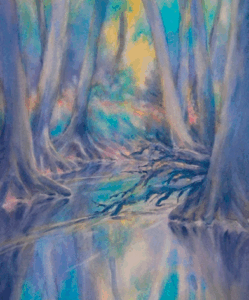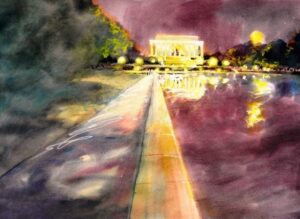Interested in an Original Painting?
Contact Virgil to inquire.
Interested in fine art prints and
more? Shop Fine Art America

“Getting Close To Home”, Watercolor, 30” X 11”
![]() 1 April 2025
1 April 2025
Welcome art lovers, patrons and painters! My blog is intended for all those who love art, collect art and make art. And especially in watercolors. We begin our blog time with a closer look at how to better understand and appreciate this beautiful yet challenging medium.
Watercolor painting is celebrated for its luminous quality, fluid movement, and unique interaction between pigment and water. Unlike other mediums, watercolor offers a delicate balance of control and spontaneity, making it both expressive and unpredictable.
One of the most captivating aspects of watercolor is its translucent nature, which allows the white of the paper to shine through the layers of pigment. This creates a glow that’s difficult to replicate with other mediums. Because watercolor doesn’t offer much room for correction, each brushstroke must be thoughtful and intentional.
Water gives watercolor its charm—and its challenge. It allows pigments to flow, blend, and settle in unexpected ways, creating organic textures and effects. Artists must learn to work with the water, embracing its unpredictability as part of the creative process.
Watercolor encourages loose, expressive brushstrokes that convey movement, energy, and emotion. Whether it’s a still life, landscape, or abstract, notice how the brush seems to dance across the paper, leaving behind fluid marks that shift and blend.

Watercolor artists often build up transparent washes in layers—a technique known as glazing—to create depth, rich color, and subtle transitions. This layering gives the painting an almost ethereal, floating quality.
Unlike more literal art forms, watercolor often emphasizes suggestion over precision. Artists may hint at form or texture without clearly defining them, inviting viewers to use their imagination to interpret and complete the scene, making the painting highly personal.
Watercolor is particularly effective at capturing light, atmosphere, and fleeting moments. Look closely at how color and brushwork work together to evoke a specific time of day, weather, or mood.
Watercolor is full of surprises. “Happy accidents” can lead to new textures, color blends, and unexpected beauty. Many artists embrace this unpredictability, allowing it to inspire creativity and innovation.

Watercolor is known for its difficulty. There’s little margin for error—unlike oil or acrylic, mistakes can’t easily be painted over. Artists must work quickly and decisively, mastering the interplay of pigment, water, and timing. Understanding this can deepen your appreciation for the skill and technique required to create a successful watercolor painting.
Whether you’re a lifelong art lover or just beginning your creative journey, understanding the unique qualities of watercolor can enhance your appreciation for this captivating medium. Future blog posts will explore watercolor techniques, tools, inspirations, and behind-the-scenes insights into my own painting process.
I hope you will share some of your own experiences, ideas and suggestions on watercolor. We can all learn together. Thanks for reading—and stay tuned for more about watercolor!
Contact Virgil to inquire.
more? Shop Fine Art America

“You Must Go Left or Right” , Watercolor, 30” X 11”